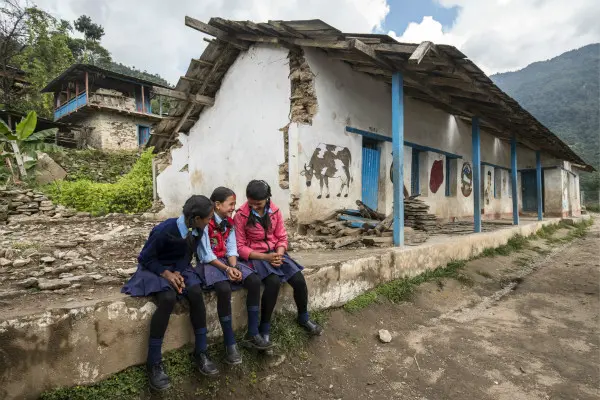The premise of Jalapa Devi Higher Secondary School located in Melamchi municipality of Sindhupalchowk district, some 50 kilometers away from the capital city, looked vibrant.
The way towards the quake-damaged school from the narrow black- topped road at small village Bahunepati was all decorated with flowers and colorful triangle-shaped fancy papers tied in ropes.
Students along with teachers were carrying a wide smile on their faces with glimmer of hopes in eyes on Wednesday as the reason was indeed special. It was the day of foundation laying ceremony of reconstruction of their two school buildings that were severely damaged in the April 25 earthquake last year, all thanks to the international support in Nepal's rebuilding drive.
At a time when the Nepali government has been criticized for taking more-than-necessary time to start rebuilding of quake-damaged schools, the northern neighbor China has taken the initiation of rebuilding of two school buildings with the support from global education foundation EF Education First.
After laying the foundation stone for reconstruction at its original site, Nepalese Vice President Nanda Kishor Pun expressed thanks to the Chinese representatives for extending support in Nepal's education sector and making the students able to gain knowledge in well-facilitated school buildings.
"Chinese assistance in post-quake recovery efforts of Nepal is really praiseworthy. I am sure that the school will be exemplary to produce skilled manpower", Vice President Pun said while addressing the function.
Established more than 50 years ago, Jalapa Devi Higher Secondary School has been teaching more than 550 students from grade nursery to twelve (+2 level) in cracked classrooms at present. This school is the biggest one in the area, which has been educating marginalized and poor students.
Under the project, the team will construct two new buildings with space for 1,200 students and teachers, including classrooms, dining rooms, reading rooms, science laboratories and offices. The school project is worth Rs 100 million(940,000 U.S. dollars).
Melissa Lam, EF China General Manager and Chief Representative told Xinhua, "We are bringing technology from overseas to make sure that it is a safe school. Hopefully, the learning we get from building school and technology we bring in can be integrated as part of the improved Nepalese safety standards."
The international support in Nepal's post quake-education is not just all about constructing building, but inviting latest global designs in this remote part of the mountainous country.
Lam added, "The design of Jalapa Devi Higher Secondary School implements the latest anti-seismic techniques from Japan and will use the first-ever use of earthquake-resistant geo-textiles in Nepal."
The improved school design is expected to be implemented by the Nepali government for future buildings as an upgraded national standard. According to the Ministry of Education, a total of 5,003 schools in 14 districts were damaged by the earthquake.
The reconstruction of school through foreign support comes at a time when the Nepali government has recently announced reconstructing school buildings in the quake-hit districts, aiming to complete the task in three years.
However, the schools authorities are not sure whether the rebuilding process would be completed in stipulated timeframe.
Bishnu Prasad Gautam, Principal at Jalapa Devi Higher Secondary School told Xinhua, "We were really struggling hard to collect fund for reconstruction of school from government in the last one year. If we had waited for their support, it would have taken years. Thankfully, we have been able to start reconstruction through international support."
"This is the best school in this region in terms of education and quality. After the completion in eight months, I am sure our school will become the largest school in the whole district," Gautam, who has been working as the Principal since last 24 years added
Many parents and students expressed their happiness over being able to enjoy 'Rights to Education' in a safe and secured environment.
"I cannot express how happy I am to know that we are getting a new school building. We were learning in a really fearful environment after quake, and it's going to be over," Ranjita Acharya, a Grade 11 student at Jalapa Devi Higher Secondary School shared with Xinhua.
This is not the first case that the Himalayan nation is receiving support from border-sharing China in its education sector. A Chinese NGO, China Foundation for Poverty Alleviation, has already started rebuilding a school in the outskirts of capital city whereas has been distributing furniture and stationary items to different schools located in worst-hit districts.
Besides China, international child rights and development organizations based on different countries have been building quake-resistant houses, community buildings, toilets, schools, health posts and other public buildings.
It is unfortunate that only little has been done in recovery of education by the government in 17 months of disaster. Government officials often complained of the difficulties of rebuilding the schools within a short span of time, citing geographical difficulty and limited resources, which caused dissatisfaction among the victims.
The situation has worsened as people are struggling for shelter while the government is yet to distribute even the first installment of housing reconstruction grant, i.e. Rs 50,000 (around 500 U.S. dollars) to households in all 14-worst hit districts.
Amid such reality, the international assistance for the revival of education sector has become a boon for the locals.
(APD)
 简体中文
简体中文

